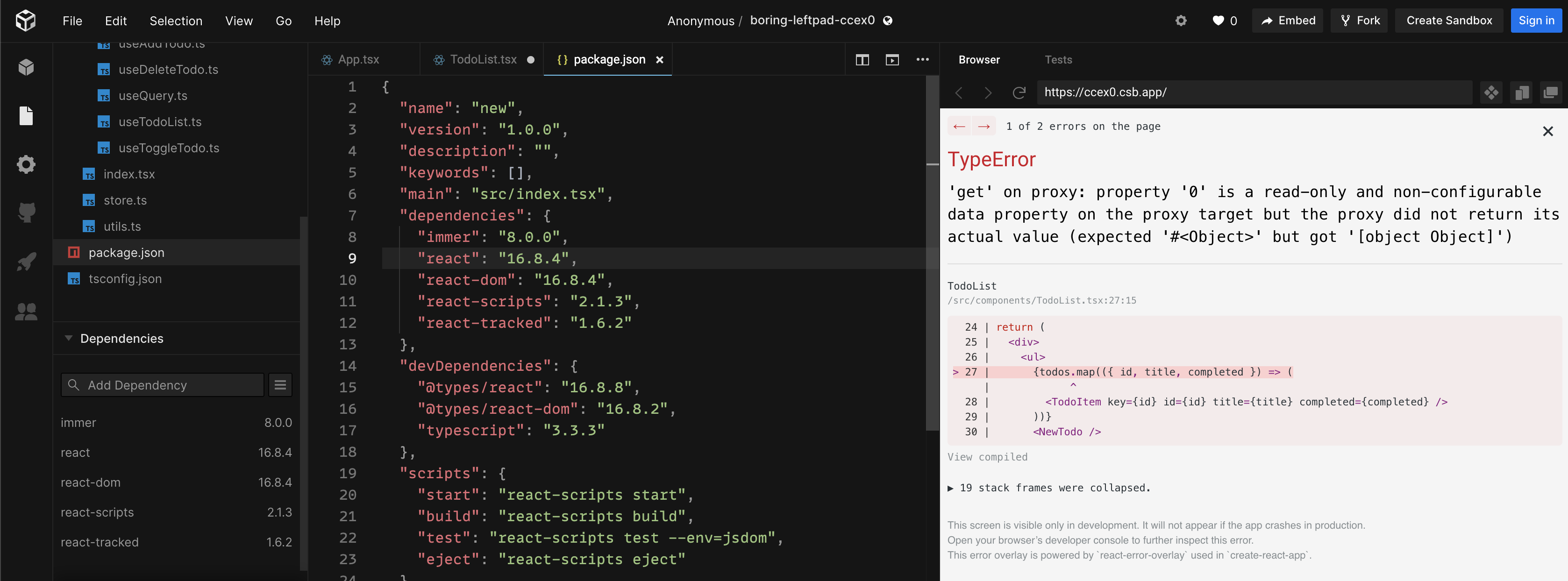State usage tracking with Proxies. Optimize re-renders for useState/useReducer, React Redux, Zustand and others.
Documentation site: https://react-tracked.js.org
Preventing re-renders is one of performance issues in React. Smaller apps wouldn't usually suffer from such a performance issue, but once apps have a central global state that would be used in many components. The performance issue would become a problem. For example, Redux is usually used for a single global state, and React-Redux provides a selector interface to solve the performance issue. Selectors are useful to structure state accessor, however, using selectors only for performance wouldn't be the best fit. Selectors for performance require understanding object reference equality which is non-trival for beginners and experts would still have difficulties for complex structures.
React Tracked is a library to provide so-called "state usage tracking." It's a technique to track property access of a state object, and only triggers re-renders if the accessed property is changed. Technically, it uses Proxies underneath, and it works not only for the root level of the object but also for deep nested objects.
Prior to v1.6.0, React Tracked is a library to replace React Context use cases for global state. React hook useContext triggers re-renders whenever a small part of state object is changed, and it would cause performance issues pretty easily. React Tracked provides an API that is very similar to useContext-style global state.
Since v1.6.0, it provides another building-block API which is capable to create a "state usage tracking" hooks from any selector interface hooks. It can be used with React-Redux useSelector, and any other libraries that provide useSelector-like hooks.
This package requires some peer dependencies, which you need to install by yourself.
yarn add react-tracked react scheduler react-domFor React Native users:
yarn add react-tracked react scheduler react-nativeThere are two main APIs createContainer and createTrackedSelector.
Both take a hook as an input and return a hook (or a container including a hook).
There could be various use cases. Here are some typical ones.
import { useState } from 'react';
const useValue = () =>
useState({
count: 0,
text: 'hello',
});This can be useReducer or any hook that returns a tuple [state, dispatch].
import { createContainer } from 'react-tracked';
const { Provider, useTracked } = createContainer(useValue);const Counter = () => {
const [state, setState] = useTracked();
const increment = () => {
setState((prev) => ({
...prev,
count: prev.count + 1,
}));
};
return (
<div>
<span>Count: {state.count}</span>
<button type="button" onClick={increment}>
+1
</button>
</div>
);
};The useTracked hook returns a tuple that useValue returns,
except that the first is the state wrapped by proxies and
the second part is a wrapped function for a reason.
Thanks to proxies, the property access in render is tracked and
this component will re-render only if state.count is changed.
const App = () => (
<Provider>
<Counter />
<TextBox />
</Provider>
);import { useSelector, useDispatch } from 'react-redux';
import { createTrackedSelector } from 'react-tracked';
const useTrackedSelector = createTrackedSelector(useSelector);const Counter = () => {
const state = useTrackedSelector();
const dispatch = useDispatch();
return (
<div>
<span>Count: {state.count}</span>
<button type="button" onClick={() => dispatch({ type: 'increment' })}>
+1
</button>
</div>
);
};import create from 'zustand';
const useStore = create(() => ({ count: 0 }));import { createTrackedSelector } from 'react-tracked';
const useTrackedStore = createTrackedSelector(useStore);const Counter = () => {
const state = useTrackedStore();
const increment = () => {
useStore.setState((prev) => ({ count: prev.count + 1 }));
};
return (
<div>
<span>Count: {state.count}</span>
<button type="button" onClick={increment}>
+1
</button>
</div>
);
};This library internally uses use-context-selector,
a userland solution for useContextSelector hook.
React 18 changes useReducer behavior which use-context-selector depends on.
This may cause an unexpected behavior for developers.
If you see more console.log logs than expected,
you may want to try putting console.log in useEffect.
If that shows logs as expected, it's an expected behavior.
For more information:
https://github.com/dai-shi/lets-compare-global-state-with-react-hooks
The examples folder contains working examples. You can run one of them with
PORT=8080 yarn run examples:01_minimaland open http://localhost:8080 in your web browser.
You can also try them in codesandbox.io: 01 02 03 04 05 06 07 08 09 10 11 12 13
See this for details.
- Super performant global state with React context and hooks
- Redux-less context-based useSelector hook that has same performance as React-Redux
- Four different approaches to non-Redux global state libraries
- What is state usage tracking? A novel approach to intuitive and performant global state with React hooks and Proxy
- How to use react-tracked: React hooks-oriented Todo List example
- Effortless render optimization with state usage tracking with React hooks
- 4 options to prevent extra rerenders with React context
- React Tracked Documentation Website with Docusaurus v2









